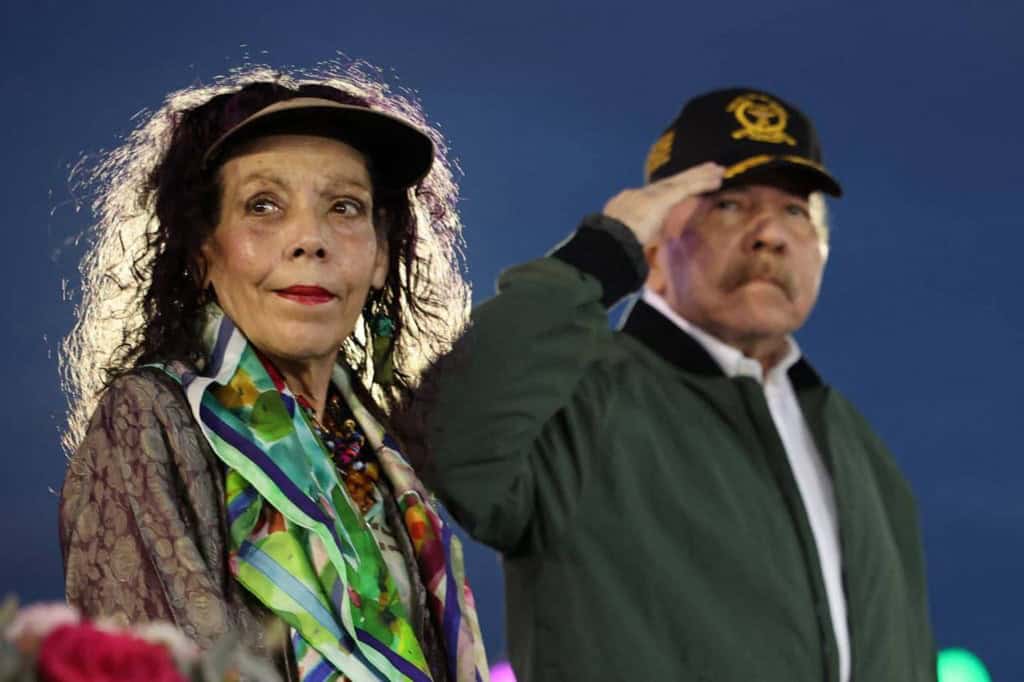The death of two imprisoned opposition figures in Nicaragua has raised alarms among exiles and human rights defenders, who attribute this new “repressive era” to an early transition of power from an ailing Daniel Ortega to his wife Rosario Murillo.
Ortega, who turns 80 on November 11, has been handing over more responsibilities to Murillo, who was elevated to “co-president” seven months ago through a constitutional reform. The following points explain the consolidation of power by the 74-year-old co-president, known for her relentless image.
Deaths of Detainees
On August 25, Washington denounced the death of opposition member Mauricio Alonso, imprisoned since July 18. Managua never acknowledged his arrest, nor that of lawyer Carlos Cárdenas, detained on August 15, whose body was handed over to his family two weeks later.
“In one week, the bodies of two people who had been disappeared were delivered […]. This is a new stage that bears Murillo’s stamp,” said Arturo McFields, former Nicaraguan ambassador to the United States.
According to Juan Pappier, deputy director for the Americas at Human Rights Watch, this new repressive era is partly “linked to Murillo’s effort to be ready for the moment of succession.”
Internal Purges
In recent months, historic Sandinista commanders Bayardo Arce, Álvaro Baltodano, and Henry Ruiz, along with Ortega’s head of security Marcos Acuña, have been arrested. “The Murillo era” is also marked by the “dismissal of historic officials or those who had sworn loyalty to Ortega,” McFields noted.
Other lesser-known militants are also in prison or under house arrest, among them the son of Carlos Fonseca, founder of the Sandinista Front. Exiled academic Uriel Pineda said that “repression has focused on the regime’s historic allies to prevent any internal opposition strategy from taking shape.”
“They are trying to clean house—deciding who should or should not remain in the inner circle of power,” said Santos Méndez, coordinator of the Nicaraguan Community in Guatemala.
Declining Health
In recent public appearances, Ortega has shown difficulty walking and a pale appearance. According to exiled doctor Richard Sáenz, who once treated the presidential family, Ortega suffers from lupus and kidney failure.
In May, his absence from the celebrations of national hero Augusto Sandino’s birth fueled rumors. “Ortega’s age is evident in his latest public appearances, as is his declining condition,” said Pineda. “There is a clear and obvious effort by Rosario Murillo to be prepared for the day Ortega’s health deteriorates or he dies,” added Pappier.
Military Command
Upon becoming co-president, Murillo assumed military command, and this week, during the Army’s anniversary ceremony, she presented the promotion stripes to officers for the first time. At the ceremony, Ortega sought to justify his wife’s rise to the top: “Women have joined all fields.”
The transition “may have accelerated because this month marks exactly one year since the death of Humberto Ortega,” said Daniel’s brother and former Army commander, said Gonzalo Carrión, an exiled human rights activist.
Humberto Ortega was placed under house arrest after telling a foreign outlet in May 2024 that he considered it “very difficult” for Daniel Ortega’s wife and children to hold onto power if Daniel died.
Family Enterprise
Murillo began gaining influence when Ortega returned to power in 2007. She served as government spokesperson, then vice president, and now co-president.
She strengthened her position during moments that weakened her husband, such as the 1998 sexual abuse accusation against Daniel Ortega by his stepdaughter Zoilamérica Narváez—Murillo’s eldest daughter.
Also after the opposition protests of 2018, which were suppressed with a toll of 300 dead. Except for Zoilamérica, all the couple’s children hold positions in government or state enterprises. The most prominent is Laureano, who manages relations with Russia and China, two key allies.
“Unfortunately, Nicaragua is the North Korea of the Western Hemisphere,” said Pappier.






